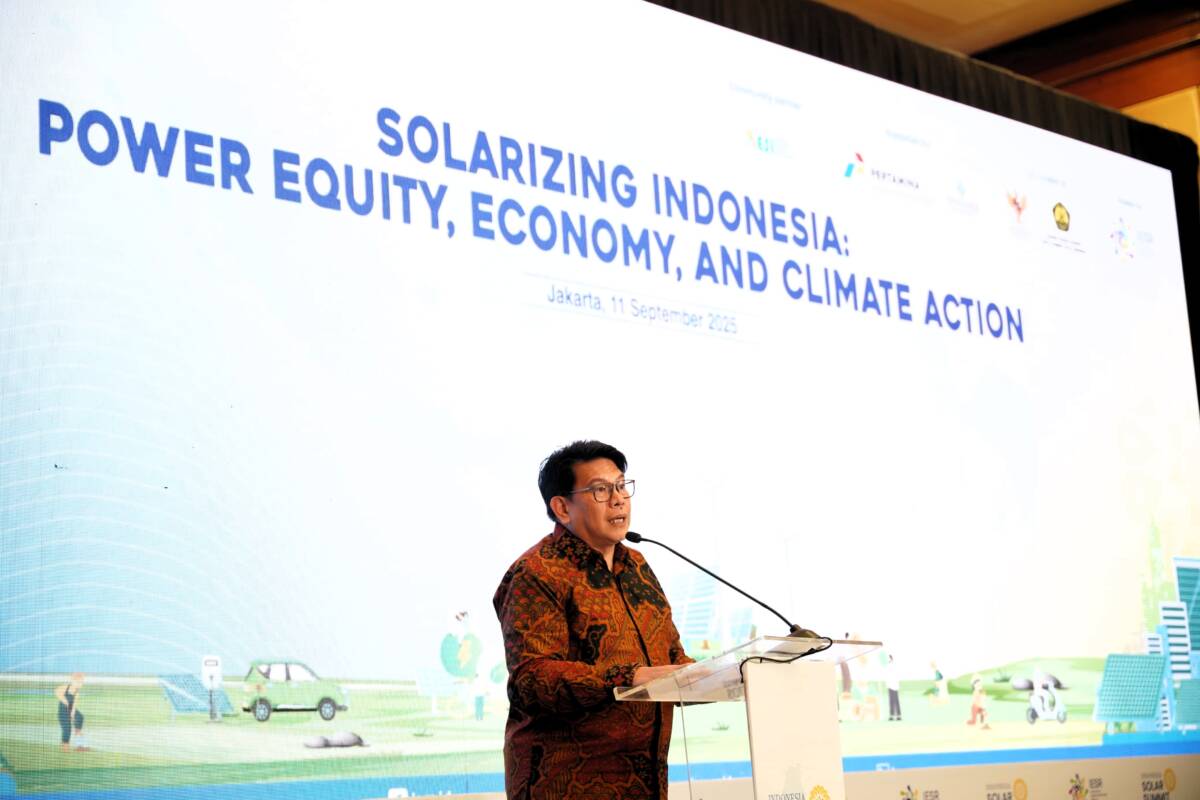Jakarta, September 11, 2025 – The impact of solar energy goes beyond providing access to electricity. It also fosters equity by enabling community participation in reducing emissions, driving the growth of new economies, and serving as a strategic solution to achieve climate goals. This vision underpins the Indonesia Solar Summit (ISS) 2025 (9/11/2025) in Jakarta, with the theme “Solarizing Indonesia: Powering Equity, Economy, and Climate Action.”
To achieve the net zero emissions (NZE) target by 2060 or earlier, the government has set a solar power capacity target of around 108.7 GW in the National Electricity Plan (RUKN). In August 2025, President Prabowo Subianto further reaffirmed this commitment by announcing plans to build 100 GW of solar PV, comprising 80 GW of distributed solar PV and 20 GW of centralized solar PV.
Director General of New, Renewable Energy, and Energy Conservation, Eniya Listiani Dewi, explained that three main solar PV programs are being implemented to meet this target, rooftop solar PV, large-scale solar PV, and floating solar PV. Moreover, solar power development is encouraged to support productive activities such as agricultural irrigation, tourism, fisheries, health services (community health centers), and schools.
“To support the development of solar power plants in Indonesia, it is essential to ensure the availability of a solar supply chain industry, accessible solar Engineering, Procurement, and Construction (EPC) services across regions, and enhanced human resource capacity, particularly in remote areas. Indonesia’s demographic bonus should be leveraged to advance national solar energy,” said Eniya.
She further emphasized the importance of increasing demand for solar power plants. Indonesia’s solar energy potential is estimated at nearly 3,200 GW, offering a significant opportunity to strengthen domestic industry and drive economic growth. “This solar energy potential can serve as a catalyst for the energy transition while accelerating economic growth to 8%,” stated the Director General of New, Renewable Energy, and Energy Conservation.
The ISS 2025 also announced the Solar Archipelago Initiative, a collective commitment by regional leaders, business and industry players, associations, and communities. The initiative aims to strengthen cross-sector collaboration and position solar energy as the driving force for energy equity, green economic growth, and tangible climate action in Indonesia.
The Institute for Essential Services Reform (IESR) highlights solar energy as a strategic entry point for developing green hydrogen and ammonia. According to IESR’s study, Indonesia has the potential for 165.9 GW of economically viable ground-mounted solar projects across 290 locations and 38.13 GW of floating solar projects across 226 locations.
Fabby Tumiwa, Chief Executive Officer (CEO) of IESR, noted that solar energy development in Indonesia still faces several major challenges, including complex policies and regulations, lengthy licensing processes, limited access to financing, outdated grid capacity, and a shortage of skilled technical workers.
“The ceiling price is not aligned with the true economics of solar projects. Fossil fuel subsidies make electricity from fossil fuel power plants appear cheaper, creating unfair competition for solar power plants. Moreover, our national electricity grid, still largely centralized and operating on outdated systems, is not yet fully prepared to accommodate large-scale solar energy deployed across diverse locations. The solution is to urgently modernize the grid, develop a smart grid system, and integrate energy storage technologies,” added Fabby.
Fabby emphasized that President Prabowo’s commitment to build 100 GW of solar power plants is a revolutionary step toward achieving energy justice. However, realizing this vision requires a community-centered approach. First, detailed planning must be carried out, including setting standards and quality systems that meet bankability requirements, stimulating demand, and building a strong and comprehensive supply chain. Second, local communities and workers must be involved and empowered to ensure the effective operation and long-term sustainability of solar power infrastructure. Third, innovation is needed to develop small-scale solar power models that are affordable and suitable for rural economic activities.
ISS 2025 presented the Solar Awards to individuals, local governments, and companies that have consistently advanced solar energy in Indonesia. In the individual category, the awards were given to Ida Bagus Dwi Giriantari and Eko Adhi Setiawan. In the local government category, the awards went to the provinces of West Java and Central Java. Meanwhile, Coca-Cola Europacific Partners Indonesia (CCEP Indonesia) received the award in the company category for its consistent use of solar energy.
Since 2022, the Institute for Essential Services Reform (IESR) and the Ministry of Energy and Mineral Resources have co-hosted the Indonesia Solar Summit (ISS). The 2025 edition, the fourth in the series, was organized in collaboration with IESR, the Coordinating Ministry for Economic Affairs, and the Ministry of Energy and Mineral Resources, with support from Pertamina New & Renewable Energy, Tenggara Strategics, and the Indonesian Solar Energy Association (AESI).
Indonesia Solar Summit (ISS) 2025, solar energy, PLTS, Solar Power Plant, renewable energy, energy transition, net zero emission, NZE 2060, Solarizing Indonesia, Solar Archipelago, RUKN, government, Prabowo Subianto, Eniya Listiani Dewi, IESR, Fabby Tumiwa, EBTKE, Ministry of Energy and Mineral Resources, green economy, decarbonization, emissions, climate, energy, Solar Awards.

